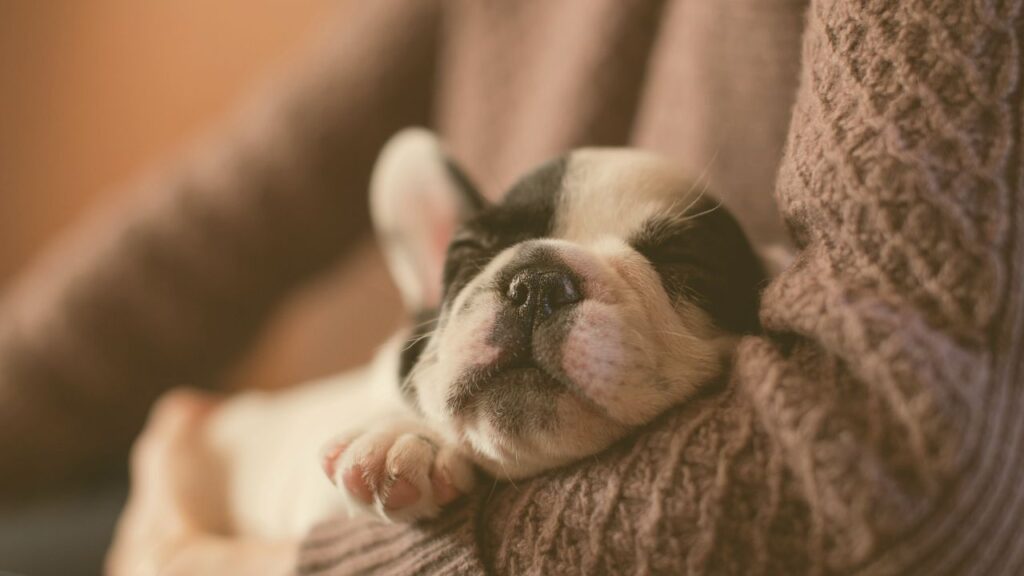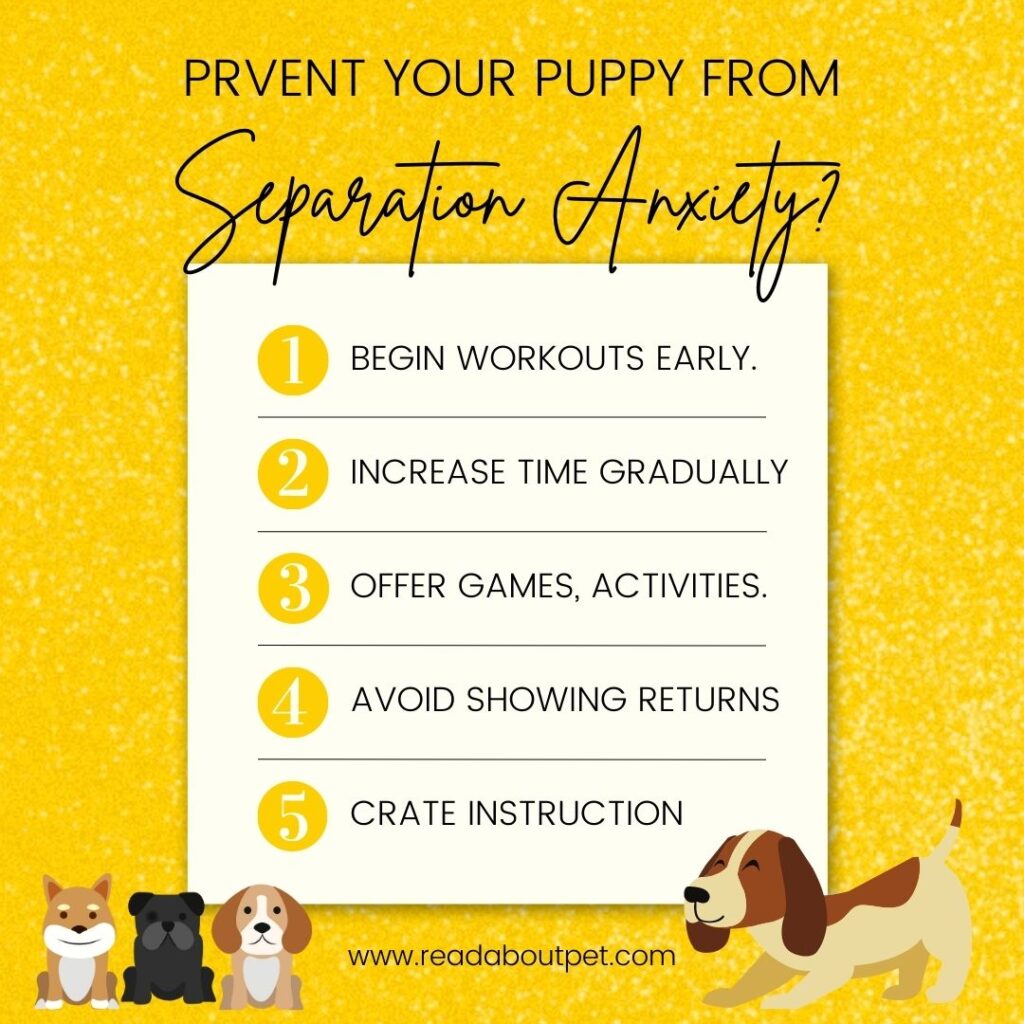Although they make wonderful companions, puppies sometimes struggle with separation anxiety, which is difficult for both the dog and the owner. Separation anxiety in dogs experience anxiety or anguish when they are removed from their owner. This article will provide guidance on how to prevent puppy separation anxiety.
Recognizing puppy separation phobia
Puppies frequently struggle with separation anxiety, which develops when a puppy exhibits distress when left alone without its owner. Puppies are gregarious animals that adore their owners’ company and comfort. When left alone, people can become worried, terrified, or bored. This can lead to destructive behavior such as chewing on furniture or excessive barking.
Puppy separation anxiety symptoms
You may observe any of the following indications if your puppy is exhibiting separation anxiety:
- When left alone, whining, barking, or wailing
- chewing on household items or other things
- attempting to get out of their box or other confinement
- Utilizing the home’s restroom
- refusing to consume anything when alone
- Pacing or agitation
- extreme drooling or panting.

How to Prevent Puppy Separation Anxiety
With the correct care and training, separation anxiety in puppies can be avoided. Before sharing som guide, with my personal experience, I will highly recommend you to use some accessories for separation anxiety relief just like, thundershirt relief, PetHonesty Hemp Calming Chews for Dogs and now follow these advice that will help you avoid separation anxiety:
Begin your workouts early.
It’s crucial to begin teaching your puppy as soon as possible to assist them become used to being by themselves. Start by only leaving them for brief intervals, then progressively lengthen your absences.
Increase Time Away Gradually
Increase your time apart from your dog little by little to avoid separation anxiety. Start by letting them be alone for only a few minutes, then work your way up to a few hours.
Offer games and activities
To keep your puppy occupied while you’re away, give them lots of toys and other things to do.Interactive toys, puzzles, and toys that may be filled with rewards are all great options.
Avoid highlighting departures and returns
Avoid making a big deal out of leaving or returning home. Say hello or farewell, then leave or enter the house.
Consider crate instruction
Separation anxiety can be effectively treated with crate training a puppy. When you’re not home, a crate door gives your puppy a safe and secure place to sleep.
Options for daycare and pet sitting
While you’re away, entrusting your puppy to a reputable pet sitter or daycare facility can help with socialization, exercise, and companionship. Do your research and pick a trustworthy company that offers a stimulating and safe environment for your puppy.
Service for walking dogs
Hiring a dog walker can be a great solution if you are unable to enroll your puppy in daycare. They can come to your home and take your puppy for a walk or some playtime throughout the day. This can offer much-needed mental and physical exercise, as well as a break from being alone.

What to Do if Your Puppy Is Already Anxious About Separation
You may do a number of things to aid your puppy if separation anxiety is already present:
Ask a veterinarian for advice on how to prevent separation anxiety in puppy.
Create a plan to treat your puppy’s separation anxiety.
Talk to your veterinarian or a certified dog trainer for guidance o read blogs from experts. They can offer direction and encouragement to help your dog get over their worry.
Think about medication
In rare circumstances, taking medication to treat your puppy’s separation anxiety may be necessary. Consult your pet’s veterinarian about available medications.
Common Myths and Fallacies
There are some widespread misconceptions and falsehoods about puppies’ separation anxiety. Some of the most typical are listed below:
Breed and age effects on separation anxiety
Some dog breeds may be more prone to anxiety or require a high level of exercise. However, any puppy can suffer from separation anxiety. Additionally, age is irrelevant because anxiety can affect puppies of any age.
Punishment as a Means of Treating Anxiety
In fact, punishing your dog for displaying worried behavior may make matters worse. This could cause your dog extra stress. They may link being alone with bad things, which would make them feel even more anxious.
The Function of Medicine in the Management of Separation Anxiety
Consulting a veterinarian before using medicine is always necessary. This is even more important when treating severe cases of separation anxiety. Medication should not be utilized as a stand-alone treatment but rather in conjunction with behavior change strategies.
Stopping Relapse (Guide to Prevent Separation Anxiety in Puppy)
Once your puppy has made strides toward overcoming separation anxiety, you must work to keep him from relapsing. Here are a few tips:
Keeping a consistent schedule
To make your puppy feel safe and secure, maintain a regular schedule for feeding, exercise, and alone time. When possible, try to keep routines from abruptly changing.
Including fresh tasks and challenges
By giving your puppy new tasks and challenges, you can keep their minds active. This can include crossword puzzles, obedience lessons, or agility drills.
Monitoring Results and Making Adjustments as Needed
Keep a close check on your puppy’s behavior and development, and if required, alter their schedule or behavior modification strategy. This can assure sustained improvement in conquering separation anxiety and help prevent its recurrence.
Conclusion
Puppies and their owners may struggle greatly with separation anxiety, but it is possible to prevent puppy separation anxiety. By providing your puppy with the right training, care, and attention, you can help him or her become used to being by themselves and stop the onset of separation anxiety.
Early training is crucial, as are a gradual increase in your absences, the provision of toys and activities, refraining from making a big deal out of departures and returns, and thinking about crate training. Consult a veterinarian or dog trainer if your puppy is already having separation anxiety, and think about taking medication.
FAQs
Is it possible to stop a puppy’s separation anxiety?
In fact, separation anxiety can be avoided with the proper care and instruction.
What is the maximum amount of time that one can leave puppies unattended?
Depending on their age and stage of development, puppies can be left alone for a few hours. To avoid separation anxiety, it’s crucial to progressively lengthen your absences.
Can medication ease puppies’ separation anxiety?
In some instances, medication may be required to treat a puppy’s separation anxiety. Ask your veterinarian for advice on available medications.
Is crate training a successful method to stop puppy separation anxiety?
Yes, preventing puppy separation anxiety with crate training can be successful. When you’re not home, a crate gives your puppy a safe and secure place to sleep.
What are the telltale indications of puppy separation anxiety?
Puppies who experience separation anxiety may whine, bark, or howl when left alone; chew on furniture or other items; try to escape from their crate or other confinement area; relieve themselves indoors; refuse food or water when left alone; pace or become restless; or pant or drool excessively.






